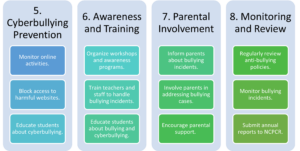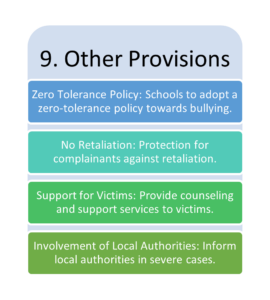NCPCR Guidelines: Prevention of Bullying and Cyberbullying in Schools
The National Commission for Protection of Child Rights (NCPCR) has taken a significant step towards ensuring a safe and nurturing environment for children by releasing comprehensive guidelines for preventing bullying and cyberbullying in schools. The guidelines provide a roadmap for schools and educational institutions to create a positive and inclusive learning space.
Applicability:
These guidelines recognises and addresses both bullying in the physical spaces as well as online space and shall be applicable to all schools and educational institutions across India.
Key Definitions:
- Bullying can be defined as an act of aggressive physical or social behaviour, intentionally and repeatedly meted out by an individual or a group towards another person(s) which causes harm or discomfort. It often involves an imbalance of power between the perpetrator and the victim, in which the victim is unable to stop it from happening. Bullying can be repetitive over time, and it can have immediate, medium, and long-term physical, mental, and psychological impacts on the bully and the bullied.
- Cyberbullying can occur through text messages, apps, social media, gaming, edtech/online learning platforms, etc. where people can view, participate in, or share content. They include sending, posting, or sharing negative, harmful, false, or mean content. It is important to note that cyberbullying can occur in any online space where people interact, and new platforms may emerge over time as technology evolves.
Key Guidelines from NCPCR:
The NCPCR guidelines are a comprehensive framework that addresses various aspects of bullying and cyberbullying prevention. Here are some of the key points:



Conclusion:
It is crucial for schools, parents, and stakeholders to work together to address bullying and cyberbullying. Effective implementation of these guidelines requires Strong commitment from school management along with Active participation from teachers, students, and parents and continuous monitoring and evaluation of the policies in place.
Disclaimer: This is an effort by Lexcomply.com, to contribute towards improving compliance management regime. User is advised not to construe this service as legal opinion and is advisable to take a view of subject experts.
